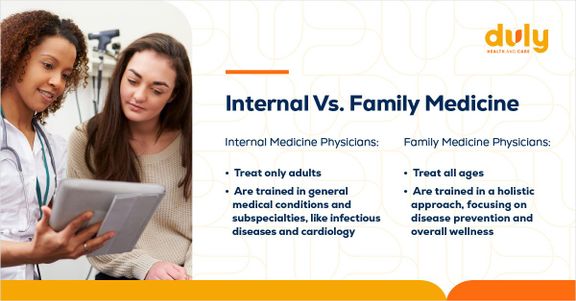For many children and teens, their pediatrician is a trusted source of information for mental, physical, and emotional health. This relationship can last months, years, or even decades.
While a pediatrician is trained in the health needs of children, the time will eventually come to see an adult primary care provider (PCP) — or someone you go to for common medical concerns in adults. You might see your PCP for a common cold, to learn about making healthy choices, or for a specific condition, like diabetes.
Adult primary care providers include internal medicine and family medicine physicians.

The transition from your pediatrician to an adult primary care provider can come with a wide range of emotions, from anxiety to excitement to confusion. It may feel overwhelming, as this person will likely be in charge of your care for a long time.
Here are 5 tips to help you choose a new primary care provider.
1. Ask for recommendations.
If you’re looking for a new restaurant to try, you’ll probably ask others for recommendations. And while your health is more important than what you eat for dinner, recommendations are still a great way to find a new provider.
One source to start with is your pediatrician, who likely understands what kind of provider you would connect well with.
You may also want to ask close friends or family members for recommendations. For instance, if you have a cousin who shares many of the same values as you when it comes to healthcare, ask them if they have a primary care provider they love.
2. Consider your unique health needs.
If you have any specific health conditions or needs, you may want to choose a healthcare provider who has more experience with them. These include:
- Health conditions, such as diabetes or asthma
- Emotional needs, such as anxiety or depression
- Lifestyle choices, such as if you’re an athlete or are a vegetarian
You may be able to find this information on your provider’s website or by calling the office and speaking to the front desk employees. You can also ask questions about a provider’s specialties during your first visit with a new provider.
If you’re female, you might also want to begin seeing an obstetrician/gynecologist (OBGYN) if you haven’t already. They specialize in the health of women, which is especially important as you get older. They also treat women during their childbearing years, including during pregnancy and childbirth. While most internal and family medicine providers can perform basic women’s health including Pap smears, it’s common for women to have both an OB/GYN and a primary care provider.
3. Verify your insurance coverage.
Once you’re considering a healthcare provider, make sure they are in your health plan’s network (also called in-network). Some insurance companies allow you to see a provider that’s not in-network, but it might be more expensive.
To see if a provider is in-network, call both the provider’s office and your health insurance. Make sure you have your insurance card with you if they need details about your plan.
4. Make an appointment with a provider.
If a healthcare provider seems to check all the right boxes for you, you may want to do some research on them, like looking at their credentials, bio, and online reviews.
Then it’s time to make an appointment to meet them in person.
Before your appointment, be sure to send your medical records to your new provider. You can do this by calling your pediatrician’s office and providing them with your new provider’s information. If you’re transferring to a provider in the same healthcare system, this may be done automatically.
Once at your appointment, you can ask your provider questions. For instance, you might want to ask about their expertise in areas that are important to you.
You’ll also want to consider factors, such as:
- How comfortable they make you feel
- Whether or not they explain things to you in a way you understand
- How sincerely they listen to your concerns
- The amount of time they spend with you
- If they give you time to ask questions and answer them thoroughly
Duly Health and Care providers are committed to making the transition from pediatrics to adult primary care seamless. Make an appointment to meet with a Duly provider today.
5. Don’t hesitate to switch providers.
The relationship between you and your primary care provider is a crucial one. If you don’t feel comfortable with a provider, you may not be as open and honest during your appointments — making it difficult for them to give you the best care possible.
If at any point you feel like you aren’t connecting with your provider, you always have the option to switch to another one. While you may need to go through the process of searching for a provider again, it will be well worth the effort to find one you trust.
Choosing a healthcare provider is a major decision, and it shouldn’t be taken lightly. By taking the time to choose an adult primary care provider who you can depend on, you’ll be benefiting your health now and in the future.
Health Topics:







